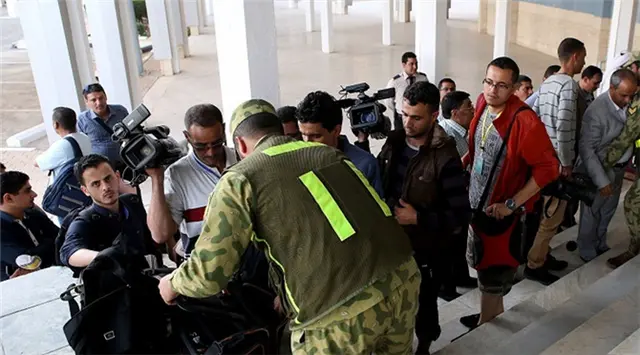Delegates of Yemen's internationally recognized government in Kuwait suspended their participation in the ongoing negotiations with Houthis for the second time this month, Yemen's foreign minister said on Tuesday.
Yemen's Foreign Minister Abdul-Malik Mekhlafi, who heads the government delegation to the Kuwait-based talks, released short statements on his official account on Twitter saying that "I've asked the UN envoy to prevent the pro-Houthi delegates from wasting more time and to ensure their commitment to the references before resuming talks."
Mekhlafi said that "after a month of negotiations, the Saleh-Houthi group comes now and demolishes the talks by rejecting the main references and other foundations such as the legitimacy."
A journalist closed to the pro-government delegation in Kuwait told Xinhua that "delegates of Houthis and their allies at the Kuwait-based talks have clearly declared that they do not recognize Yemen's government legitimacy."
"Houthis delegation refused to recognize the legitimacy of the government and that's the reason caused today's setback and the suspension of talks," the journalist based in Kuwait said.
The withdrawal of Yemen's government delegation resulted in canceling Tuesday's session of peace talks with the Shiite Houthi group and their allies in Kuwait, according to the Yemeni sources.
Sources at the office of Yemen's legitimate President Abd-Rabbu Mansour Hadi said that "an important statement will be released by the government delegation likely to mention the reasons of the withdrawal of the UN-facilitated peace talks."
On May 8, Yemen's Shiite Houthi delegation pulled out of the peace talks sponsored by the United Nations in Kuwait in protest against a Saudi-led coalition airstrike that they said killed seven of their followers.
The talks began in Kuwait on April 21 under the auspices of the United Nations to seek a reconciliation to end over a year of civil war in Yemen.
The talks are the third of its kind since the conflict began after Houthi militias stormed the capital Sanaa and expelled Hadi with his government into exile in September 2014. Previous peace negotiations had failed to end hostilities.
Two days ago, the UN Special Envoy for Yemen Ismail Ould Cheikh Ahmed said that "progress being achieved albeit at a relatively slow pace. We call on parties to agree on a comprehensive solution as soon as possible."
"The two delegations have important decisions to consider in this critical period of Yemen's history," Ould Cheikh Said.
The talks enter the fifth week, but rival negotiators have so far failed to agree on the agenda in line with the UN Security Council Resolution 2216.
The resolution orders Houthi militias to withdraw from Sanaa and all other cities, hand back weapons and release political prisoners before forming new sharing transitional government.
Houthi and Saleh delegates have been insisting on forming a new transitional government before discussing other topics.
Both rival delegations keep trading accusations of cease-fire breaches all over the three weeks of talks that progress slowly.
The civil war has drawn in Saudi-led coalition on March 2015, in response to President Hadi's call to restore his internationally recognized government to capital Sanaa.
The civil war has killed more than 6,000 people, half of them civilians, injured more 35,000 others, and displaced over two millions, according to humanitarian aid agencies.
Yemen's conflict began after 2011 massive popular protests that demanded end to the 33-year rule of then President Ali Abdullah Saleh.
(APD)
 简体中文
简体中文

